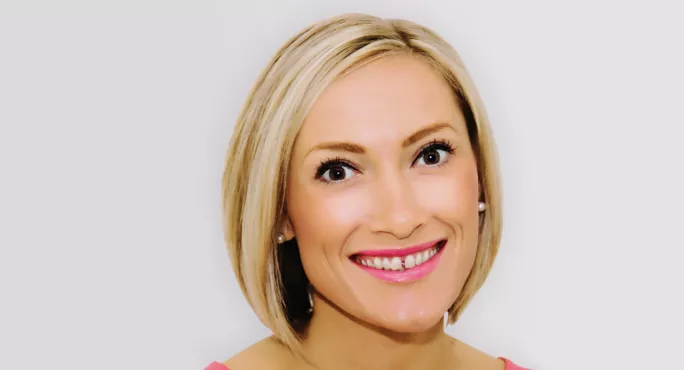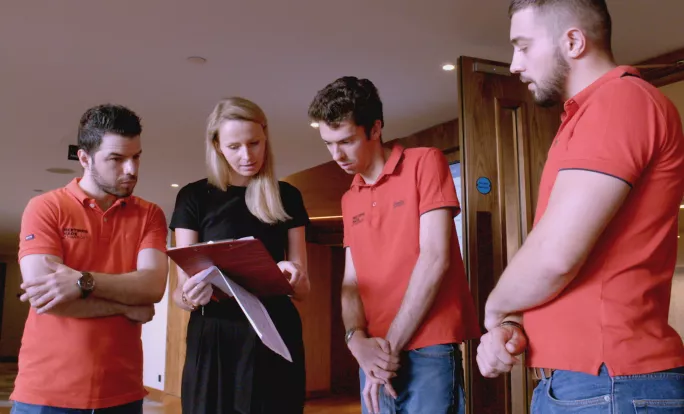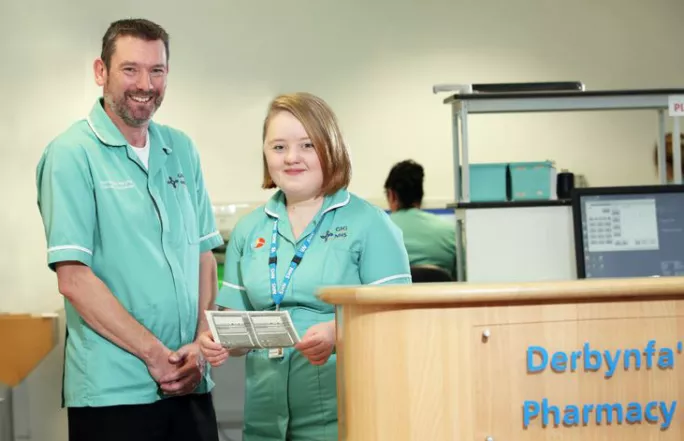- Home
- ‘I won’t stop until thousands of SEND people have jobs’
‘I won’t stop until thousands of SEND people have jobs’

Claire Cookson says she has “got lucky” many times throughout her career – but there's no doubt about it, she is a woman on a mission.
At 39 years-old, she leads the DFN Charitable Foundation, where she drives her team forward with a single mission: to help young people with additional needs to progress into full-time work.
It’s an uphill battle. Currently in the UK, just 5.9 per cent of learners with additional support needs go on to have careers, and that figure has actually dropped in the past few years. The remaining 94 per cent, as Cookson puts it, “drop off a cliff” after leaving education.
So Cookson has made it her life’s work to support these young people into the workplace.
News: 'Changes to the law on ECHPs will have serious impact'
Student perspective: What lockdown has been like for a learner with SEND
Listen: A bespoke approach for students with SEND
Her story begins in Mollington, a small village in Oxfordshire. She had what she views as a typical childhood, attending “the tiniest school in the world”, where there were just seven pupils in her year group, two of them called Claire. A secondary education in Northamptonshire followed, and Cookson went on to study drama at Coventry University. To support her degree, she got a job teaching performing arts at a Stagecoach school on Sunday mornings.
Falling in love with teaching
It was her time at Stagecoach, she says, that made her fall in love with teaching. She decided to leave her dreams of performing behind, and instead train to become a teacher, going on to study a PGCE in post-compulsory education at UCL’s Institute of Education.
Soon after that, she found herself a permanent fixture at UCL: not as a student, but as a part-time lecturer.
“The institute was honestly such a pivotal point for me. It was a true vocation. As soon as I left the IfE, they called me and asked me to go back and be a visiting lecturer on the PGCE course. I remember being asked by students how long I’d been teaching. And I would say, 'Errr, well actually this is my first year,'” she says.
Cookson worked her lecturing hours around her first teaching job: teaching theatre at Spelthorne College, a sixth-form college in Surrey. It was in this position that she says she “got really lucky” – and after her NQT year, she joined the leadership team as a head of department.
“There was an opening and I went for it. I have been in education leadership from my first year of teaching, which is really exciting. It was not a grand plan at all, but it was just the right place at the right time. I worked really hard, and I loved doing it. I bet people say this all the time, but teaching has always been very joyful for me,” she says.
Having higher aspirations
A few years later, when Spelthorne merged with Brooklands College, Cookson says she got “pretty lucky” again. She became head of the creative industries department across both campuses. Her success, she says, was thanks to the leaders she had around her.
“I worked with very experienced leaders, and just watched and learned. When you’re around these brilliant leaders, you learn so much. I think I got pretty lucky: I paid attention to people who were doing a great job,” she says.
It was at Brooklands that Cookson gained her first insight into what education was like for learners with additional learning needs. She was part of the peer-review inspection team that observed the additional learning department.
“It was really fascinating to me: I could see that the work they were doing was great and that the lecturers were really good people, but what I noticed were how low the expectations were in that department in terms of the outcomes versus in other areas of the college,” she says.
“I was really struck by that, and I thought, 'We need to have higher aspirations for these incredible human beings.'”
Three years later – six years into Cookson’s teaching journey – a family relocation to Warwickshire resulted in her taking a determined step into SEND education. She became an assistant head at Round Oak School, a secondary school with a sixth form attached for students with additional learning needs.
At Brooklands, there was never any question that students – no matter what level they studied at or what needs they may have – wouldn’t get jobs. However, what struck her at Round Oak, she says, was that despite an incredible ethos, no one ever considered that students may go on to get paid jobs.
“There was this real protection around learners in a special school, and that was done with the very best intentions from all the staff, but they had completely different expectations of their learners. Students would do years and years at the college, but then fall off the cliff. Their worlds would fall apart, and their parents' world could fall apart.
“I genuinely thought, 'Hang on, I have to do something here.' Because I’d come from mainstream, everyone was like, 'Ooh, she’s a bit brave with her ideas,'” she says.
The school was just a couple of roads behind the headquarters of National Grid – and the work experience co-ordinator had secured a two-week work placement for one of the students. But Cookson’s vision was bigger than that. In a meeting with National Grid, a manager asked Cookson what the best thing that it could offer the college would be.
Career opportunities for SEND students
Cookson’s reply was quick and bold: to let her set up a school at National Grid.
“I didn’t know what I meant by that particularly. But what I knew was that if we could take those learners out of the special school and put them in a different environment, something just told me that they would thrive and that they would prove to everybody that they could absolutely get jobs,” she says.

And that’s exactly what they did. Cookson wrote a curriculum over the summer holidays, and within three months, a supported internship was running at National Grid.
In the pilot year, five students from Round Oak worked at National Grid full-time, and Cookson went to the site to teach the education provision. The rest of the time, the students were interns fully integrated into the departments within the company. She says that, at the time, it was groundbreaking in Warwickshire – nothing like it had been attempted before.
At the end of the programme, four out of those five learners got jobs at National Grid. The interns, she says, became heroes at the school.
“It really started to raise aspiration across the school and we’d take our Year 9s and Year 10s to National Grid and see the internship in action and they’d come back to school suddenly re-engaging or engaging more with education because suddenly it had a meaning. It was utterly incredible, and that was a real evolution, and the model is still thriving,” she says.
“It busted a ton of myths. In society, some people think that if students have got learning needs and they want to get jobs that must mean doing ground maintenance or very basic low-level jobs. And actually they got jobs in the safety and resilience team, in corporate affairs, in customer liaison. They were awesome jobs.”
As the model thrived, Cookson started to actively involve the other schools and colleges in the area, worried that she was creating a postcode lottery. She wanted it to be something that all students could benefit from.
And then Cookson started to wonder: what would happen to students with additional needs if you introduced the idea of employability from the start of their education journey?
Starting the employability journey in Reception
Her next career move to Woodlands School, an all-through special school in Warwickshire, answered that question. As associate headteacher, she redesigned the curriculum, working with economists to explore the core employability skills that every learner needs.
“I really had to take the staff on that journey. Of course, that sounds very aspirational and to begin with, they thought, 'This isn’t for us to do – this is what you do when you go into sixth form.' But what I’d really learned through my work at Round Oak is that when securing EHCPs, parents have to really labour about what their child cannot do. They are forced to focus on the negatives.
“If no one talks to them about a career until they are aged 16 or 17, they can feel very anxious about their child getting jobs. I wanted to flip that and say, 'What if we talked to them when their child is four-years-old about getting jobs?' It was brilliant, and it gave parents hope of what the future could look like.”

Last year, Cookson took another leap in her career – again, a move that she says she never planned for. While in her role at Woodlands, she gave a presentation at the Department for Education around employment and curriculum design. There, she met David Forbes-Nixon, the chairman of DFN foundation. He spoke to her about the ambition the foundation had to spread the growth of support internships.
“I just thought, 'Oh my goodness! That drive, passion and the ambition to scale it up in that way – it was everything that I believed in. If I had stayed at Woodlands, I could have only impacted on the lives of those who were at school. Whereas at the DFN Foundation, I could change thousands,” she says.
A woman on a mission
Cookson became deputy chief executive of DFN in January 2019. Now, just a year and a few months on, Cookson is the chief executive of both the DFN Foundation, and of DFN Project Search, an arm of the charity that develops supported internships.
“We want to get 20,000 people into jobs in the next 10 years. We really want to eradicate the postcode lottery. Our best outcome is that every local offer would have a support internship offer for those who could and should access it," she says.
“That’s what we work towards, and I just felt absolutely compelled to work with the phenomenal DFN team to raise ambition across the country and raise aspiration. There is some amazing practice in the UK and there are areas where there isn’t a strong supported internship route for people with learning needs, and that just feels really unfair."
Cookson hasn’t quite hung up her teaching shoes just yet, however – she’s a governor at a school in Warwickshire, she’s the chair of the board of a school in Surrey, and she oversees the strategic development of the supported internships programme at Warwickshire County Council.
And despite her quick career progression: Cookson says that she sees herself at DFN for the foreseeable. Her passion for what supported internships can offer young people with additional needs shines through every answer.
“Everyone deserves the right to aspire to their very best future, but that seems to be something that traditionally we have denied to young people with learning needs. My work is not done yet here. There is so much that we want to achieve and I really want to be part of this for a long time,” she says.
“Until it is systematic change, I think that’s what I’m looking for. This needs to become the norm, this needs to be just what happens. I am not going to stop until we’ve got so many thousands and thousands getting jobs a year.”
Keep reading for just £1 per month
You've reached your limit of free articles this month. Subscribe for £1 per month for three months and get:
- Unlimited access to all Tes magazine content
- Exclusive subscriber-only stories
- Award-winning email newsletters



